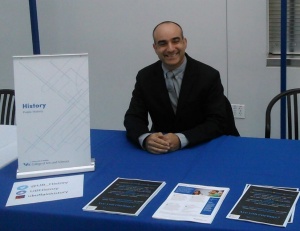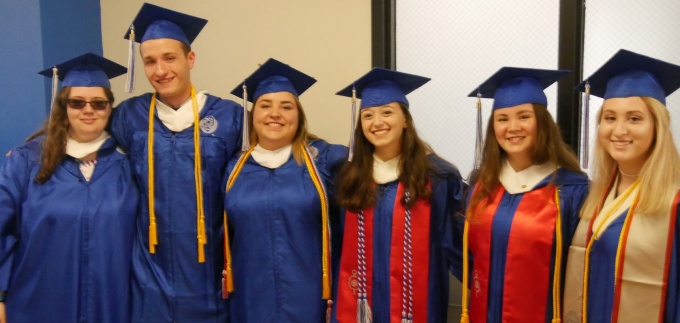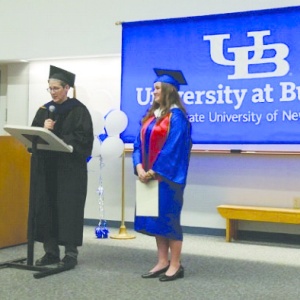Undergraduate Student News

Camilo Trumper recently joined the History Department after working in the American Studies program. This year he became the Director of Undergraduate Studies. We asked him a couple questions, both as new faculty member of the department and as the DUS.
Even though you’re not new to the area, tell us how you ended up at UB–how did your career evolve and what drew you to Buffalo?
What draws me to Buffalo has a lot to do with professional, but also personal histories. As a child of parents forced into exile, I moved around quite a bit in my early years. Toronto was a center to which I returned more than once. Raised in-motion, in-between Canada, Chile, and the United States, I appreciate Buffalo’s place as a bi-national city. Coming to Buffalo was in a sense a return “home,” an opportunity to be close to family in Toronto and New York.
I received my doctorate in Latin American History from the University of California, Berkeley and I taught History for a year at Stanford University, so I spent quite a few years out west before joining the American Studies Department at UB. As a Latin Americanist historian in an American Studies department that approached “America” hemispherically, I had the chance to expand my interest in transnational and regional histories, mobility, migration and immigration, and Latinx pasts and presents. American Studies gave me the opportunity to grow in new directions that have strengthened my teaching; but I am very excited to be a part of the History Department, where I plan to help grow our existing strengths in Latin American, Atlantic World and twentieth-century histories.

2019 graduating History Majors (R-L) Elizabeth Metzger, Matthew Plant, Katherine Schuster, Marisa Mezzio, Madeline Chiarella, Shannon Cantlon
What are your areas of interest in terms of teaching and research?
I am most interested in 19th and 20th century Latin American History, with a focus on dictatorship and displacements, cities and streets, art and political contest. My first book, Ephemeral Histories: Public Art, Politics and the Struggle for the Streets in Chile is a cultural history of the street in Salvador Allende’s democratically elected socialist government in Chile. My book looks again at this Cold War history, and shows how a wide range of Chilenas and Chilenos lay claim to city streets and walls, sometimes only for an hour or a day, and in so doing, reshaped national politics. Ephemeral Histories charts how political action became every day practice under Allende: workers occupied factories and families seized vacant lands to demand fair working and living conditions; protestors marched through city streets; and young people scrawled slogans, painted murals, and pasted posters on concrete walls streets, asserting their right to the city and, in so doing, demanded to be heard and reckoned with as citizens. Ephemeral Histories here offers an expansive view of political action and citizenship rooted in the city and in urban life. It is a history of the street that suggests that we, as 20th and 21st century political historians, must reckon with an exceptionally wide range of actors, and with the myriad traces they leave behind in the archive. It is built around the study of graffiti, murals, posters, photography, food and film alongside the press, courts and congress, as crucial spaces of and with the myriad traces they leave behind in the archive. It is built around the study of graffiti, murals, posters, photography, food and film alongside the press, courts and congress, as crucial spaces of and sources for political history.

Madeline Chiarella received the Outstanding Senior Award during the 2019 graduation ceremony.
What are you working on now? What brought you to your current areas of interest and research?
My first book ends by investigating how the military regime that toppled Allende in a bloody military coup on September 11, 1973 used violence to unmake the forms of political citizenship built in democracy. My second project builds on these insights, but pivots to focuses on the history of childhood, adolescence, and the schoolhouse in Dictatorship. This is an exploration of everyday life in dictatorship focused through a granular investigation of young people’s experience of and response to state violence, terror and torture. It shows how young people built new and creative forms of political activism in the schoolhouse, and organized vibrant, clandestine political communities that soon spilled into streets. These young people played a crucial role in the struggle against dictatorship, and helped topple a bloody regime that had held power for more than a decade and a half. Taking the schoolhouse as the center of a study of political citizenship helpsus rethink how young people struggled to make and remake the public sphere in the Chilean dictatorship; it is also, for me, an exploration of personal history, an opportunity to contextualize my own experience as a child born of exiled parents who “returned” to a country I had never known, and whose experience was refracted through the prism of a school built and run by adults whose lives had been shaped by state violence.
I am currently working also on a shorter article on the construction of childhood as a political category in Chilean film, and a third project on Chilean street food that looks at how food and eating serves as a means of thinking through, and shaping policy regarding immigration and race in the 20th and 21st centuries.
Would you share with us something that readers might not get from your CV or departmental bio? Hobbies, background, other activities/areas of interest?
I realized the need for activity to balance long hours in the archive and in front of the computer during the long process of research and writing my dissertation and first book. This led me to train for and receive a black belt in Hapkido, a Korean martial art, in graduate school.